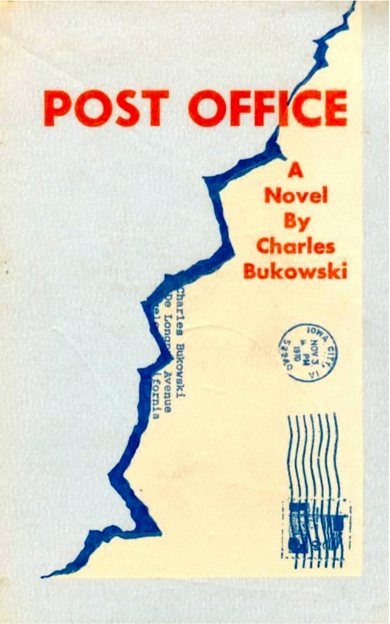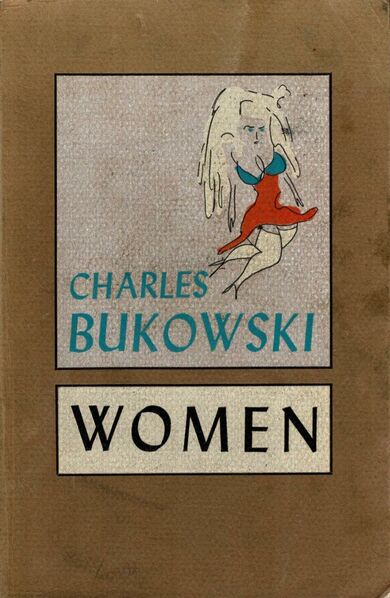I was casing next to G.G. early one morning. That’s what they called him: G.G. His actual name was George Greene. But for years he was simply called G.G. and after a while he looked like G.G. He had been a carrier since his early twenties and now he was in his late sixties. His voice was gone. He didn’t speak. He croaked. And when he croaked, he didn’t say much. He was neither liked nor disliked. He was just there. His face had wrinkled into strange runs and mounds of unattractive flesh.
No light shone from his face. He was just a hard old crony who had done his job: G.G. The eyes looked like dull bits of clay dropped into the eye sockets. It was best if you didn’t think about him or look at him.
But G.G., having all that seniority had one of the easiest routes, right out on the fringe of the rich district. In fact, you might call it the rich district. Although the houses were old, they were large, most of them two stories high. Wide lawns mowed and kept green by Japanese gardeners. Some movie stars lived there. A famous cartoonist. A best-selling writer. Two former governors. Nobody ever spoke to you in that area. You never saw anybody. The only time you saw anybody was at the beginning of the route where there were less expensive homes, and here the children bothered you. I mean, G.G. was a bachelor. And he had this whistle. At the beginning of his route, he’d stand tall and straight, take out the whistle, a large one, and blow it, spit flying out in all directions. That was to let the children know he was there. He had candy for the children. And they’d come running out and he’d give them candy as he went down the street. Good old G.G.
I’d found out about the candy the first time I got the route. The Stone didn’t like to give me a route that easy but some– times he couldn’t help it. So I walked along and this young boy came out and asked me,
“Hey, where’s my candy?”
And I said, “What candy, kid?”
And the kid said, “My candy! I want my candy!”
“Look, kid,” I said, “you must be crazy. Does your mother just let you run around loose?”
The kid looked at me strangely.
But one day G.G. got into trouble. Good old G.G. He met this new little girl in the neighborhood. And gave her some candy. And said, “My, you’re a pretty little girl! I’d like to have you for my own little girl!”
The mother had been listening at the window and she ran out
screaming, accusing G.G. of child molestation. She hadn’t known about G.G., so when she saw him give the girl candy and make that statement, it was too much for her.
Good old G.G. Accused of child molestation.
I came in and heard The Stone on the phone, trying to explain
to the mother that G.G. was an honorable man. G.G. just sat in front of his case, transfixed.
When The Stone was finished and had hung up, I told him:
“You shouldn’t suck up to that woman. She’s got a dirty mind.
Half the mothers in America, with their precious big pussies and their precious little daughters, half the mothers in America have dirty minds. Tell her to shove it. G.G. can’t get his pecker hard, you know that.”
The Stone shook his head. “No, the public’s dynamite! They’re
dynamite!”
That’s all he could say. I had seen The Stone before—postur– ing and begging and explaining to every nut who phoned in about anything . . .
I was casing next to G.G. on route 501, which was not too bad. I had to fight to get the mail up but it was possible, and that gave one hope.
Although G.G. knew his case upsidedown, his hands were slowing. He had simply stuck too many letters in his life—even his sense-deadened body was finally revolting. Several times during the morning I saw him falter. He’d stop and sway, go into a trance, then snap out of it and stick some more letters. I wasn’t particularly fond of the man. His life hadn’t been a brave one, and he had turned out to be a hunk of shit more or less. But each time he faltered, something tugged at me. It was like a faithful horse who just couldn’t go anymore. Or an old car, just giving it up one morning.
The mail was heavy and as I watched G.G. I got death-chills. For the first time in over 40 years he might miss the morning dispatch! For a man as proud of his job and his work as G.G., that could be a tragedy. I had missed plenty of morning dis– patches, and had to take the sacks out to the boxes in my car, but my attitude was a bit different.
He faltered again.
God o mighty, I thought, doesn’t anybody notice but me?
I looked around, nobody was concerned. They all professed, at one time or another, to be fond of him—"G.G.'s a good guy." But the “good old guy” was sinking and nobody cared. Finally I had less mail in front of me than G.G.
Maybe I can help him get his magazines up, I thought. But a clerk came along and dropped more mail in front of me and I was almost back with G.G. It was going to be close for both of us. I faltered for a moment, then clenched my teeth together, spread my legs, dug in like a guy who had just taken a hard punch, and winged the mass of letters in.
Two minutes before pull-down time, both G.G. and I had got– ten our mail up, our mags routed and sacked, our airmail in. We were both going to make it. I had worried for nothing. Then The Stone came up. He carried two bundles of circulars. He gave one bundle to G.G. and the other to me.
“These must be worked in,” he said, then walked off.
The Stone knew that we couldn’t work those circs in and pull– down in time to meet the dispatch. I wearily cut the strings around the circs and started to case them in. G.G. just sat there and stared at his bundle of circs.
Then he put his head down, put his head down in his arms and began to cry softly.
I couldn’t believe it. I looked around.
The other carriers weren’t looking at G.G. They were pulling down their letters, strapping them out, talking and laughing with each other.
“Hey,” I said a couple of times, “hey!”
But they wouldn’t look at G.G.
I walked over to G.G. Touched him on the arm: “G.G., ”I said, “what can I do for you?”
He jumped up from his case, ran up the stairway to the men’s locker room. I watched him go. Nobody seemed to notice. I stuck a few more letters, then ran up the stairs myself.
There he was, head down in his arms on one of the tables. Only he wasn’t quietly crying now. He was sobbing and wailing. His whole body shook in spasms. He wouldn’t stop.
I ran down the steps, past all the carriers, and up to The Stone’s desk.
“Hey, hey, Stone! Jesus Christ, Stone!” “What is it?” he asked.
“G.G. has flipped out! Nobody cares! He’s upstairs crying! He needs help!”
“Who’s manning his route?”
“Who gives a damn? I tell you, he’s sick! He needs help!”
“I gotta get somebody to man his route!”
The Stone got up from his desk, circled around looking at his carriers as if there might be an extra one somewhere. Then he hustled back to his desk.
“Look, Stone, somebody’s got to take that man home. Tell me where he lives and I’ll drive him home myself—off the clock. Then I’ll carry your damned route.”
The Stone looked up:
“Who’s manning your case?”
“Oh, God damn the case!” “GO MAN YOUR CASE!”
Then he was talking to another supervisor on the phone: “Hello, Eddie? Listen, I need a man out here . . . ”
There’d be no candy for the kids that day. I walked back. All the other carriers were gone. I began sticking in the circu– lars. Over on G.G.'s case was his tie-up of unstuck circs. I was behind schedule again. Without a dispatch. When I came in late that afternoon, The Stone wrote me up.
I never saw G.G. again. Nobody knew what happened to him. Nor did anybody ever mention him again. The “good guy.” The dedicated man. Knifed across the throat over a handful of circs from a local market—with its special: a free box of a brand
name laundry soap, with the coupon, and any purchase over $3.





